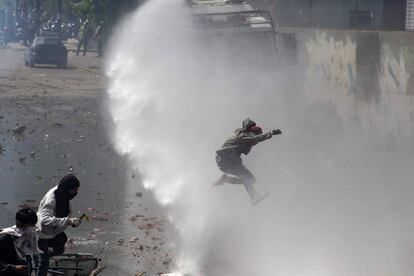Venezuelan opposition leader attacked by security forces after protest march
Henrique Capriles hit in face with helmet and punched by officers from Bolivarian National Guard

Venezuelan opposition leader and former presidential candidate Henrique Capriles was attacked and injured by members of the Bolivarian National Guard on Monday at the conclusion of a protest march in the capital, Caracas.
The incident took place following the opposition’s so-called “march of the fallen,” in memory of the 59 people who have died over the course of the last two months, which have seen renewed protests against the regime of President Nicolás Maduro.
The march on Tuesday began, as usual, in the opposition-controlled east of Caracas, but most protestors were prevented from entering the center of the city by security forces firing tear gas and using water cannon.
Venezuela is in the throes of an unprecedented crisis that is hitting it from all sides
Among the small groups that made it into the center of Caracas was Carlos Paparoni, the leader of the Primero Justicia (Justice First) opposition party, who ran into a group of riot police manning a water cannon. A video posted on social networks shows Paparoni being hit by a burst of water and falling to the ground. He suffered a fractured skull and injuries to his shoulder.
Up to 16 members of Capriles’s team were also attacked by police: seven were shot with rubber bullets, and the other nine were tear gassed, beaten with motorcycle helmets and whipped.
Capriles, who is governor of the key state of Miranda, to the north of the capital, later tweeted that several of his supporters were robbed as they sought shelter from riot police. The emergency services in Baruta, an opposition stronghold in the east of Caracas, attended to 147 injured people, 64 of them hit by projectiles and 12 with dislocated limbs.
Venezuela is in the throes of an unprecedented crisis that is hitting it from all sides: it has one of the highest inflation rates in the world, violence and crime are rampant, people are unable to find necessary everyday items, and the fabric of society is breaking down.

At the end of March, the government-controlled Supreme Court briefly stripped the National Assembly of its powers, returning them within a few days, but sparking new street protests over the last three weeks. Since then, Maduro has announced he intends to rewrite the Constitution.
The opposition’s tactic of street protests has so far failed to bring about any change in Venezuela. In 2014, a wave of unrest swept the country, leaving more than 40 dead.
The opposition has four main demands: new elections; the release of political prisoners such as Leopoldo López, the former mayor of Chacao, a district of Caracas, who has been in jail since 2014; the creation of a “humanitarian channel” to help meet food and medicine shortages; and finally, full recognition of the authority of the National Assembly, which is controlled by the opposition.
English version by Nick Lyne.
Tu suscripción se está usando en otro dispositivo
¿Quieres añadir otro usuario a tu suscripción?
Si continúas leyendo en este dispositivo, no se podrá leer en el otro.
FlechaTu suscripción se está usando en otro dispositivo y solo puedes acceder a EL PAÍS desde un dispositivo a la vez.
Si quieres compartir tu cuenta, cambia tu suscripción a la modalidad Premium, así podrás añadir otro usuario. Cada uno accederá con su propia cuenta de email, lo que os permitirá personalizar vuestra experiencia en EL PAÍS.
¿Tienes una suscripción de empresa? Accede aquí para contratar más cuentas.
En el caso de no saber quién está usando tu cuenta, te recomendamos cambiar tu contraseña aquí.
Si decides continuar compartiendo tu cuenta, este mensaje se mostrará en tu dispositivo y en el de la otra persona que está usando tu cuenta de forma indefinida, afectando a tu experiencia de lectura. Puedes consultar aquí los términos y condiciones de la suscripción digital.








































